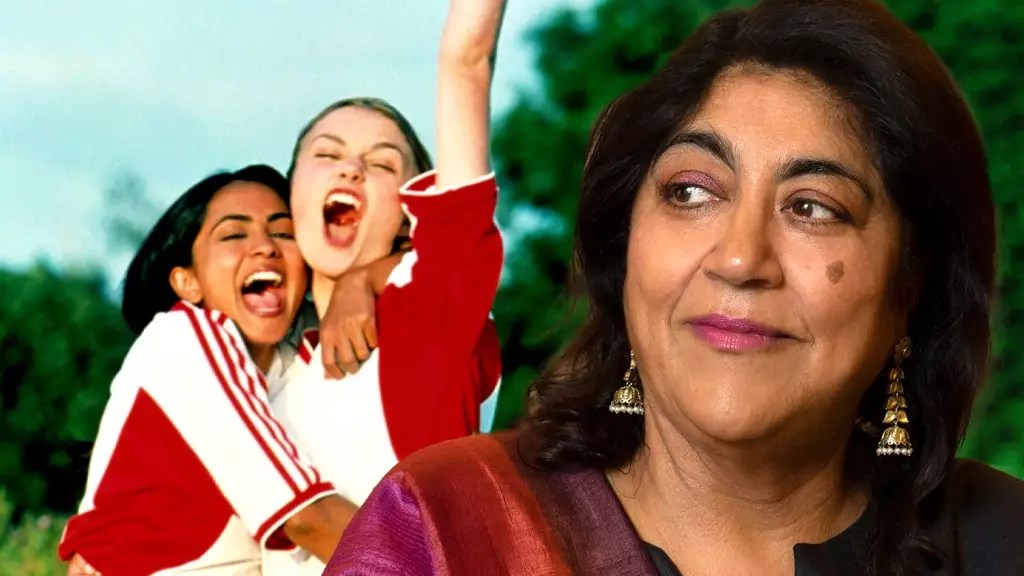For nearly two decades, Gurinder Chadha’s *Bend It Like Beckham* has stood as a landmark film that transcended mere entertainment to become a rallying cry for gender equality and cultural representation. The film’s enduring appeal lies in its authentic portrayal of teenage dreaming, family struggles, and women’s empowerment—elements that resonate across generations and global borders. Now, Chadha’s ambitious plan to develop a sequel signifies more than just revisiting beloved characters; it heralds a conscious effort to amplify the film’s original message amid a changing world increasingly receptive to women’s sports and diversity.
One cannot overstate the significance of Chadha’s decision to revisit this story. It demonstrates her recognition that the cultural landscape has shifted dramatically since 2002. Women’s football, once a niche sport struggling for recognition, has blossomed into a dynamic, fiercely competitive global phenomenon. With the upcoming FIFA Women’s World Cup in Brazil and the growth of professional leagues around the world, the timing couldn’t be better. Chadha’s sequel aims to harness this momentum, positioning her film as both an inspiration and a mirror reflecting the modern state of women’s sports—flourishing, competitive, and inclusive.
This project isn’t just about nostalgic revival; it’s a strategic and politically resonant move. Chadha’s desire to portray her characters with meaningful arcs and to showcase their evolution indicates her commitment to crafting a narrative that resonates authentically in today’s socio-cultural context. The fact that she and her team are working to ensure strong scripts and character development underscores her intent to deliver a film that is not only entertaining but also empowering. Her vision is clear: to inspire young women, to challenge stereotypes, and to elevate the narrative around women’s participation in sports and society.
The Power of Legacy and Contemporary Inspiration
Chadha’s reflection on her initial hesitance and subsequent motivation highlights a critical truth: storytelling that amplifies marginalized voices and underrepresented stories has a profound, long-lasting impact. Her original film, made when women’s football was viewed skeptically, paved the way for new perspectives and opportunities. Its cultural significance was rooted in its ability to inspire girls and women worldwide, challenging societal expectations and igniting dreams.
Now, Chadha emphasizes that her motivation springs from a fresh, powerful story that she recently conceived. This isn’t merely a nostalgic remaking; it’s an opportunity to build on the original film’s legacy with contemporary relevance. Her close collaboration with her husband, Paul Mayeda Berges, hints at a fresh creative energy and modern humor, ensuring the sequel stays true to its roots yet creatively expands into new territory. Chadha’s focus on delivering characters with compelling, diverse, and respectful narratives aims to make the sequel a meaningful addition to the cinematic landscape.
The connection between the film’s themes and real-world progress in women’s football is striking. Emma Hayes, head coach of the U.S. women’s national team, once a young actress crying during the original film, now embodies the sport’s evolution. Her tales of transformation—both personal and professional—exemplify the kind of stories Chadha aims to highlight. The synergy between these narratives reinforces the idea that *Bend It Like Beckham* is more than a film; it’s a movement that captures the essence of aspiration, resilience, and community.
Reimagining a Cultural Catalyst for Future Generations
The potential of this sequel extends beyond cinematic artistry. It symbolizes a broader societal shift where women’s sports are no longer sidelined but celebrated and supported at the highest levels. Chadha’s openness about her initial struggles—being dismissed by studios and industry insiders—makes her current confidence all the more compelling. She recognizes her own journey and sees the sequel as an extension of her lifelong mission: to uplift girls and women through storytelling.
By aligning this project with prominent figures like Emma Hayes and receiving endorsements from government officials like Lisa Nandy MP, Chadha’s vision acquires institutional and cultural weight. Her statement about the film reflecting Britain’s diversity and resilience underscores her belief that stories like hers are vital components of national identity and pride. The film’s capacity to inspire generations is rooted in its capacity to depict not just the joy of sport but the perseverance needed to break down barriers—a message that remains vital today.
Furthermore, Chadha’s keen understanding that her story is intrinsically linked to the societal narratives of gender, race, and ambition makes her approach uniquely potent. Her desire to create a hard-hitting yet joyous film suggests an intention to spark conversations about equality, community, and self-belief, while still delivering entertainment that uplifts and entertains. It’s not enough to revisit nostalgia; her goal is to catalyze future change, one story at a time.
A Bold Leap Toward Inspiration and Cultural Legacy
Chadha’s renewed energy and vision suggest she sees her role not just as a filmmaker but as a cultural torchbearer. The original *Bend It Like Beckham* shattered stereotypes during a time when women’s football was relegated to the margins. Today, her sequel promises to carry that torch further, emphasizing that sports and stories about women’s achievements are integral to national pride and identity.
Her ambition to have the film ready by 2027 — in time for the 25th anniversary of the original’s release — indicates a strategic blending of celebration and ambition. It’s a move that could rejuvenate interest in the film’s themes, aligning them with the burgeoning global profile of women’s sports. It also signifies Chadha’s confidence that her story still has relevance and power, capable of inspiring a new wave of fans, athletes, and changemakers.
Ultimately, her unwavering belief that her characters will resonate anew in a changed world, combined with her commitment to crafting authentic narratives, exemplifies her vision of filmmaking as a form of social activism. This sequel isn’t merely about entertainment; it’s about reclaiming cultural space for women and marginalized communities, and reminding the world of the enduring power of storytelling to inspire hope, change, and inclusivity.
